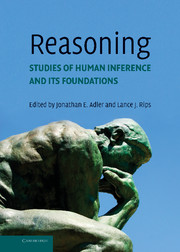Book contents
- Frontmatter
- Contents
- Preface
- List of Contributors
- Introduction: Philosophical Foundations
- PART I FOUNDATIONS OF REASONING
- PART II MODES OF REASONING
- Section 3 Deductive Reasoning
- Section 4 Induction
- Section 5 Dual and Integrative Approaches
- 20 Human Reasoning and Argumentation: The Probabilistic Approach
- 21 Individual Differences in Reasoning and the Algorithmic/Intentional Level Distinction in Cognitive Science
- 22 Reasoning, Decision Making, and Rationality
- Section 6 Abduction and Belief Change
- Section 7 Causal and Counterfactual Reasoning
- Section 8 Argumentation
- PART II INTERACTIONS OF REASONING IN HUMAN THOUGHT
- Index
- References
22 - Reasoning, Decision Making, and Rationality
Published online by Cambridge University Press: 05 June 2012
- Frontmatter
- Contents
- Preface
- List of Contributors
- Introduction: Philosophical Foundations
- PART I FOUNDATIONS OF REASONING
- PART II MODES OF REASONING
- Section 3 Deductive Reasoning
- Section 4 Induction
- Section 5 Dual and Integrative Approaches
- 20 Human Reasoning and Argumentation: The Probabilistic Approach
- 21 Individual Differences in Reasoning and the Algorithmic/Intentional Level Distinction in Cognitive Science
- 22 Reasoning, Decision Making, and Rationality
- Section 6 Abduction and Belief Change
- Section 7 Causal and Counterfactual Reasoning
- Section 8 Argumentation
- PART II INTERACTIONS OF REASONING IN HUMAN THOUGHT
- Index
- References
Summary
Introduction
The psychological fields of reasoning and of decision making are reported in different literatures, mostly by different authors and with little cross-reference. Is this just a matter of research traditions, or are the cognitive processes involved fundamentally different? On the face of it, a reasoning task is significantly different from a decision task. In the study of deductive reasoning, for example, subjects may be presented with the premises of some argument and asked whether or not a conclusion follows. For example, a subject may be asked to evaluate a syllogism such as
No A are B
Some B are not C
Therefore, some C are not A
and to indicate whether or not the conclusion follows. This is presumed to involve a process of reasoning from the premises which may or may not support the conclusion. If the subject has deductive competence – discussed below – it should be possible for him or her to solve the problem set without further information. In this sense, deductive reasoning tasks can be viewed as a special case of well-defined problem-solving tasks, whose main purpose is to investigate people's ability to understand and apply logical principles.
Decision-making tasks, on the other hand, involve choices between actions and normally involve commitment to particular acts at one point in time, whose consequences will only later be apparent. A simple example might be deciding whether or not to place a bet on a horse.
- Type
- Chapter
- Information
- ReasoningStudies of Human Inference and its Foundations, pp. 437 - 450Publisher: Cambridge University PressPrint publication year: 2008

